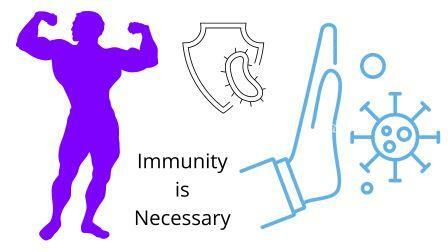Q- Define Immunization class 12
Answer- Immunization is the term that is used to define the procedure to provide or inject a vaccine inside an organism’s body to generate immunity to fight against the microbe of a particular disease.
The process of immunization helps in generating antibodies inside the body of an organism to defend against microbes of a specific disease.
The organism’s body is used to gain immunity against the microbes of a specific disease through the process of immunization.
In other words, Immunization is also defined as the procedure of vaccination that can easily be used with interchangeability with inoculation or vaccination.
Class 9th Important Questions
- Why health and disease are antagonistic to each other
- Give the significance of proper and sufficient food in preventing the disease.
- Chronic diseases are considered more serious than acute diseases. why?
As in the above post, we told you about ‘define immunization class 12’ so we covered this topic in little detail in the above answer.
But if you still want to read more about ‘Immunization’ then we have a lot for you. You can read the content given below. This will be very informative for you. Before starting with Immunization.
Immunization
Immunization refers to the process of vaccinating an organism to resist a specific disease. Through the process of immunization, antibodies are generated inside the body of the organism that helps in defending against microbes or disease.
Vaccines are made for some specific diseases that are enough serious that they cannot be cured or resisted by medicines. You can also learn it as ‘define immunization class 12’
Immunization is the process by which resistance is induced (produced) against any disease in both plants and animals.
This discussion is totally focused on immunization against several infectious diseases in vertebrate animals, specifically in humans.
The immunization process includes the formation of antibodies in the body of an organism that helps in preventing several diseases. These antibodies do not react to the entire pathogen but only to a specific part of it, which is called an antigen of that microbe.
An individual can acquire immunity to any specific pathogen in two manners. The first one is active and another one is passive.
Immunity
Immunity refers to the power of the body of an organism to defend against any disease or disease-causing microbe.
Immunity from disease is actually conferred by two cooperative defense systems, which are called nonspecific, innate immunity, and specific acquired immunity.
Nonspecific protective mechanisms repel all microorganisms in an equal manner, while the specific immune responses are tailored to particular types of invaders. Both systems work together to thwart any disease-causing microbe in an organism’s body.

Immune system
The immune system is the strength of an organism to defend against disease-causing microbes. If any organism has a weak immune system so there will be higher chances of getting infected by any microbe easily as compared to one with a strong immune system.
We should focus on building our body and staying healthy. This makes our immune system stronger. If you have a strong immune system so there will be no chances or very less chances of getting sick (infected) quickly.
Our motive for this paragraph is that you should make your immune system strong to avoid disease and live a healthy lifestyle.
